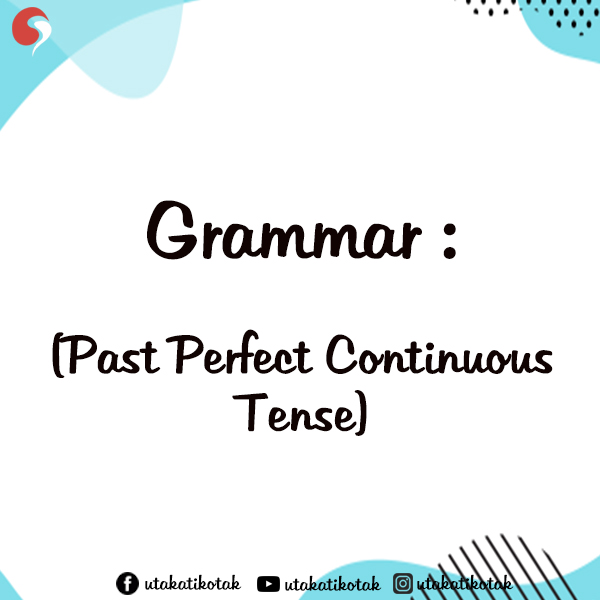Grammar : Past Perfect Continuous Tense

Fungsi Past Perfect Continuous Tense
1. Menceritakan tindakan yang telah terjadi dan sedang berlangsung di masa lalu sampai titik waktu tertentu di masa lalu juga.
Contoh :
When Indra came, Nina had been cooking.
Kalimat ini menceritakan kejadian di masa lampau. Ini menceritakan bahwa ketika Indra datang, Nina sedang memasak, dan kegiatan memasak ini sudah dimulai sejak Indra belum datang. Kegiatan memasak itu telah terjadi dan juga telah selesai di masa lampau.
2. kalimat pengandaian (Conditional Sentence) Type III
Contoh :
If it hadn’t been raining, we would have played football.
Kalimat diatas mengungkapkan suatu pengandaian tentang suatu hal yang tidak benar-benar terjadi, atau kita membayangkan seolah-olah kejadian itu terjadi.
3. kalimat tak langsung (reported / indirect speech)
Contoh:
Direct speech : “She was cooking”
Indirect speech : She said that she had been cooking.
Rumus Past Perfect Continuous Tense
1. Positif (+)
Subject + had + been + verb-ing + object
2. Negatif (-)
Subject + had + not + been + verb-ing + object
3. Tanya (?)
Had + subject + been + object ?
Contoh kalimat Past Perfect Continuous tense :
He had been living in Jakarta about ten years (+)
– Dia telah sedang tinggal di Jakarta sekitar 10 tahun
He had not been living in Jakarta about ten years (-)
– dia belum tinggal di Jakarta sekitar 10 tahun
Had He been living in Jakarta about ten years ? (?)
– apakah dia telah tinggal di Jakarta selamat 10 tahun ?
Perbedaan antara Present Perfect Continuous and Past Perfect Continuous
Ada perbedaan mendasar dalam penggunaan Present Perfect Continuous dan Past Perfect Continuous Tense. Present Perfect Continuous digunakan untuk mengungkapkan tindakan yang terus berlanjut sampai sekarang, sedangkan kejadian yang menggunakan pola Past Perfect Continuous itu telah terjadi dan telah selesai. Contoh :
We have been living here since October.
Kami telah hidup di sini sejak Oktober. (Kami sudah hidup di sini sejak Oktober, tapi sampai saat ini, kami juga masih tinggal di tempat itu)
We had been living here since October.
Kami telah tinggal di sini sejak Oktober. (kami menceritakan bahwa kami pernah tinggal di sini sejak Oktober, tapi kini sudah tidak tinggal di tempat itu lagi)
Contoh Kalimat
a. Positive
1. He was angry because Anton had been coming late into his private course.
2. I had been introducing my friend to your friend when you asked me to introduce my friend to you.
3. You had been laughing when the teacher rebuked you.
4. We had been managing the money by our own self when a new staff came and helped us.
5. I had been painting the wall in my house for a week without anyone help.
b. Negative
1. He was angry because Anton had not been coming late into his private course.
2. I had not been introducing my friend to your friend when you asked me to introduce my friend to you.
3. You had not been laughing when the teacher rebuked you.
4. We had not been managing the money by our own self when a new staff came and helped us.
5. I had not been painting the wall in my house for a week without anyone help.
c. Interogative
1. Had Anton been coming late into his private course? He was angry because of that?
2. Had I been introducing my friend to your friend when you asked me to introduce my friend to you?
3. Had you been laughing when the teacher rebuked you?
4. Had they been managing the money by their own self when a new staff came and helped them?
5. Had I been painting the wall in my house for a week without anyone help?
Artikel Terkait
- Introductions (Perkenalan)
- asd
- asd
- Sinonim akulturasi adalah kontak kabudayaan #sinonim #bahasa #akulturaasi #bahasaindonesia #antonim
- Pada Suatu Pertemuan, Hadir 10 Orang yang Saling Berjabat Tangan. Banyaknya Jabat Tangan yang Terjadi Adalah... Jawaban dan Pembahasan
- Suku Kelima Suatu Barisan Aritmatika Adalah 22, Sedangkan Kesembilan Adalah 42. Suku Kelima Belas Sama Dengan... Jawaban dan Pembahasan
- Mata Uang yang Sering Digunakan Sebagai Alat Pembayaran dan Kesatuan Hitung Dalam Transaksi Ekonomi dan Keuangan Internasional Disebut...
- Kingdom yang Tidak Memiliki Dinding Sel... Jawaban dan Pembahasan
- Organel Sel yang Berperan Untuk Mendetoksifikasi Racun Adalah... Jawaban dan Pembahasan
- Diketahui Harga 4 kg Jeruk, 1 kg Semangka, dan 2 kg Apel Adalah Rp 54.000,00. Harga 1 kg Jeruk, 2 kg Semangka, dan 2 kg Apel Adalah Rp 43.000,00. Sedangkan Harga 3 kg Jeruk, 1 kg Semangka, dan 1 kg Apel Adalah Rp 37.500,00. Berapakah Harga 1 kg Semangka?